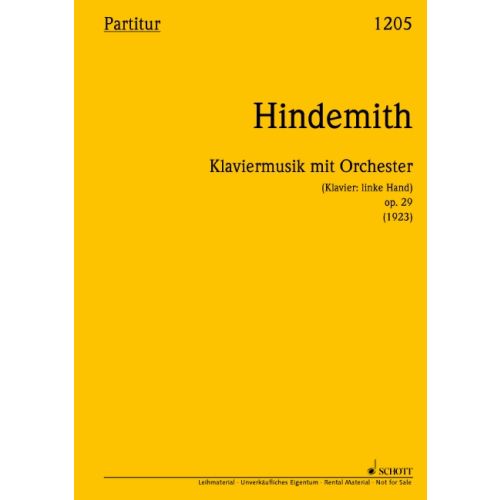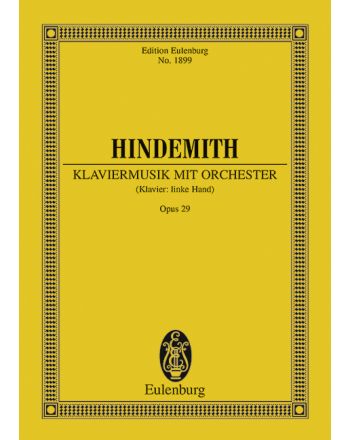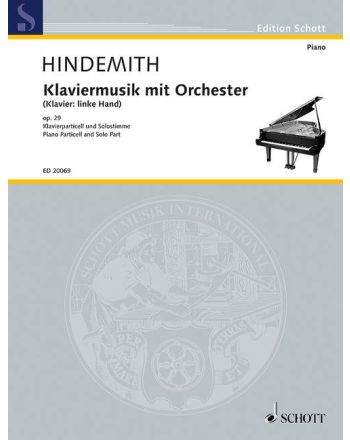Product Details
Description
Paul Hindemith (1895-1963) composed the Klaviermusik (Klavier: linke Hand) mit Orchester, Op. 29 during a time overflowing with musical activities, which also brought long-term changes into his life. He had achieved a spectacular breakthrough as a composer in 1921 with the premieres of the one-act operas Mörder, Hoffnung der Frauen, Op. 12 and Das Nusch-Nuschi, Op. 20 in Stuttgart as well as the Third String Quartet, Op. 16 in Donaueschingen. Works such as the one-act opera Sancta Susanna, Op. 21, the Kammermusik Nr. 1, Op. 24/1 and the Suite 1922, Op. 26 for piano show him to be a radical avant-gardist. He was now considered the leading German composer of his generation, a reputation that he was able to consolidate over the long term with a plethora of new works in nearly all genres, including ballet, film and entertainment music as well as parody pieces. Moreover, Hindemith founded the Amar Quartet (in which he played the viola) for the premiere of his Third String Quartet. With his ensemble, he was responsible for the premieres of numerous works by composers such as Pfitzner, Webern, Habá, Krenek, Jarnach and Weill. In 1922 he was elected to the programming committee of the Donaueschingen chamber music performances and was thus able to exercise a lasting influence on the development of music during those years there as the driving force behind the programming. Moreover, the renowned publishing house of Schott in Mainz settled an exclusive contract for the publication of Hindemith's works, enabling him to leave his position as concertmaster in the Frankfurt Opera Orchestra on 23 April 1923 in order to work as a free-lance composer and interpreter.
Hindemith's reputation and newly acquired fame were crowned by the first composition commission he received during this time: Paul Wittgenstein's (1887-1961) well remunerated commission for a concertante work for piano left-hand and orchestra. It was not only a well-paid commission but also, most importantly at this peak time of inflation, in hard currency ($). The pianist, Paul Wittgenstein, who came from one of the wealthiest families in Austria and had lost his right arm during the First World War, wished to be provided with a repertoire written especially for him and achieved this with such commissions, which also went to Korngold, Strauss, Franz Schmidt, Britten, Prokofiev and Ravel. For his part, Hindemith had come to the fundamental conclusion during these years that a composer should only write works "if he knows for what requirements he is writing it. The times of composing for its own sake are over, perhaps forever." In June and July 1922, Hindemith had embarked upon the composition of the song cycle Das Marienleben to poems of Rainer Maria Rilke, but then wrote the ballet Der Dämon, Op. 28 during the autumn of that year. He apparently wanted to continue working on Das Marienleben in November, but it seems that he agreed upon the commission from Wittgenstein and discussed it with him on 5 December 1922, when the Amar Quartet gave a concert in Vienna (documents pertaining to this have not been handed down). Hindemith now interrupted the composition of Das Marienleben, first completing the second part (Sehr lebhafte Halbe) of the Klaviermusik mit Orchester dated 22 February 1923, then the third part (Trio, Basso ostinato. Langsame Viertel, nur sehr wenig Ausdruck) on 27 February. The final part (Finale. Bewegte Halbe) followed in April 1923. Hindemith announced these three parts to the work's commissioner in a letter dated 9 May 1923 with the following words: "Dear Herr Wittgenstein, Tomorrow morning the score of the last three parts of your concerto will be on their way to you. I still haven't been able to write out the first part because I have a terrible amount of work to do - but so that you won't have to wait too long, you will be receiving what is finished of the piece, about 80% of the whole thing. [...] I would be sorry if the piece didn't bring you joy - you might find it a bit strange to listen to at first -I wrote it with a great deal of love and like it very much." And in Hindemith's note accompanying the three announced parts when they were sent: "Here are the three final movements of your piece and I hope that your shock will subside after perusing the score. It is a simple, completely unproblematic piece and I am sure that you will enjoy it after a time. (Perhaps you are appalled at first, but that does not matter.) In any case, you will surely understand the piece - in case of any doubt I will always be there to give you precise information." Hindemith only finished the missing first part (Einleitung. Mäßige schnelle Halbe) on 24 May 1923; he then sent it to Wittgenstein.
Wittgenstein's reactions to Hindemith's Klaviermusik mit Orchester have not been handed down. He never performed the work in public; therefore he must, apparently, have been rather too appalled at the work - as Hindemith had feared. But since Wittgenstein not only secured the exclusive performing rights for the work during his lifetime, but also claimed these rights ruthlessly and exhaustively, the work could neither be published nor handed over to another pianist, although its publication was announced in a 1925 Hindemith works catalogue for that same year. The work is, of course, not mentioned in an exchange of letters between Hindemith and his publishers. Hindemith's wife Gertrud communicated tersely with an interested pianist in 1950 as follows: "The Concerto is the property of Herr Wittgenstein and my husband has no control over it at all." In a list of "Unprinted Pieces for a Possible Complete Edition" from the mid-1950s, Hindemith does expressly include the Klaviermusik mit Orchester.
In the Wittgenstein estate, only accessible in 2002, only one copy of unknown origin - a fair copy, but with a good number of errors - of the Klaviermusik mit Orchester has been preserved. It was obtained in the same year by the Hindemith Foundation (Switzerland) and since then has been kept at the Hindemith Institute, Frankfurt/Main. The autograph score as well as the autograph solo parts of the work, delivered to Wittgenstein according to the indications in the letters from Hindemith to Wittgenstein quoted above, must be regarded as lost. In the Hindemith estate, on the other hand, likewise kept at the Hindemith Institute, sketches resembling short-score for the first, third and fourth parts of the work have been preserved. With the help of these, the note-text of the copy of the work could at least be proof-read and rectified as required without any problem. Thus, 81 years after its composition, Hindemith's Klaviermusik (Klavier: linke Hand) mit Orchester, Op. 29 is finally accessible and can be made known for the first time. (Giselher Schubert, Translation: David Babcock)
Hindemith's reputation and newly acquired fame were crowned by the first composition commission he received during this time: Paul Wittgenstein's (1887-1961) well remunerated commission for a concertante work for piano left-hand and orchestra. It was not only a well-paid commission but also, most importantly at this peak time of inflation, in hard currency ($). The pianist, Paul Wittgenstein, who came from one of the wealthiest families in Austria and had lost his right arm during the First World War, wished to be provided with a repertoire written especially for him and achieved this with such commissions, which also went to Korngold, Strauss, Franz Schmidt, Britten, Prokofiev and Ravel. For his part, Hindemith had come to the fundamental conclusion during these years that a composer should only write works "if he knows for what requirements he is writing it. The times of composing for its own sake are over, perhaps forever." In June and July 1922, Hindemith had embarked upon the composition of the song cycle Das Marienleben to poems of Rainer Maria Rilke, but then wrote the ballet Der Dämon, Op. 28 during the autumn of that year. He apparently wanted to continue working on Das Marienleben in November, but it seems that he agreed upon the commission from Wittgenstein and discussed it with him on 5 December 1922, when the Amar Quartet gave a concert in Vienna (documents pertaining to this have not been handed down). Hindemith now interrupted the composition of Das Marienleben, first completing the second part (Sehr lebhafte Halbe) of the Klaviermusik mit Orchester dated 22 February 1923, then the third part (Trio, Basso ostinato. Langsame Viertel, nur sehr wenig Ausdruck) on 27 February. The final part (Finale. Bewegte Halbe) followed in April 1923. Hindemith announced these three parts to the work's commissioner in a letter dated 9 May 1923 with the following words: "Dear Herr Wittgenstein, Tomorrow morning the score of the last three parts of your concerto will be on their way to you. I still haven't been able to write out the first part because I have a terrible amount of work to do - but so that you won't have to wait too long, you will be receiving what is finished of the piece, about 80% of the whole thing. [...] I would be sorry if the piece didn't bring you joy - you might find it a bit strange to listen to at first -I wrote it with a great deal of love and like it very much." And in Hindemith's note accompanying the three announced parts when they were sent: "Here are the three final movements of your piece and I hope that your shock will subside after perusing the score. It is a simple, completely unproblematic piece and I am sure that you will enjoy it after a time. (Perhaps you are appalled at first, but that does not matter.) In any case, you will surely understand the piece - in case of any doubt I will always be there to give you precise information." Hindemith only finished the missing first part (Einleitung. Mäßige schnelle Halbe) on 24 May 1923; he then sent it to Wittgenstein.
Wittgenstein's reactions to Hindemith's Klaviermusik mit Orchester have not been handed down. He never performed the work in public; therefore he must, apparently, have been rather too appalled at the work - as Hindemith had feared. But since Wittgenstein not only secured the exclusive performing rights for the work during his lifetime, but also claimed these rights ruthlessly and exhaustively, the work could neither be published nor handed over to another pianist, although its publication was announced in a 1925 Hindemith works catalogue for that same year. The work is, of course, not mentioned in an exchange of letters between Hindemith and his publishers. Hindemith's wife Gertrud communicated tersely with an interested pianist in 1950 as follows: "The Concerto is the property of Herr Wittgenstein and my husband has no control over it at all." In a list of "Unprinted Pieces for a Possible Complete Edition" from the mid-1950s, Hindemith does expressly include the Klaviermusik mit Orchester.
In the Wittgenstein estate, only accessible in 2002, only one copy of unknown origin - a fair copy, but with a good number of errors - of the Klaviermusik mit Orchester has been preserved. It was obtained in the same year by the Hindemith Foundation (Switzerland) and since then has been kept at the Hindemith Institute, Frankfurt/Main. The autograph score as well as the autograph solo parts of the work, delivered to Wittgenstein according to the indications in the letters from Hindemith to Wittgenstein quoted above, must be regarded as lost. In the Hindemith estate, on the other hand, likewise kept at the Hindemith Institute, sketches resembling short-score for the first, third and fourth parts of the work have been preserved. With the help of these, the note-text of the copy of the work could at least be proof-read and rectified as required without any problem. Thus, 81 years after its composition, Hindemith's Klaviermusik (Klavier: linke Hand) mit Orchester, Op. 29 is finally accessible and can be made known for the first time. (Giselher Schubert, Translation: David Babcock)
Orchestral Cast
2 (2. auch Picc.) · 2 · Engl. Hr. · Es-Klar. · 2 (in A u. B) · Bassklar. · 2 - 2 · 2 · 3 · 0 - P. S. (Trgl. · hg. Beck. · Schellentr. · Schellentr. ohne Schellen · kl. Tr. · Holztr. · Rührtr. · gr. Tr. m. Beck. · Glsp.) (4 Spieler) - Str.
Content
I Einleitung
II Sehr lebhafte Halbe
III Trio. Basso ostinato
IV Finale
II Sehr lebhafte Halbe
III Trio. Basso ostinato
IV Finale
More Information
Title:
Klaviermusik mit Orchester
Klavier nur linke Hand
Edition:
Performance material
Publisher/Label:
Schott Music
Year of composition:
1923
Opus:
op. 29
Duration:
18 ′0 ′′
World Premiere:
December 9, 2004 · Berlin (D)
Philharmonie
Leon Fleisher, Klavier · Conductor: Simon Rattle · Berliner Philharmoniker
Philharmonie
Leon Fleisher, Klavier · Conductor: Simon Rattle · Berliner Philharmoniker
Series:
Technical Details
Media Type:
Hire/performance material
Product number:
LS 2247-01
Delivery rights:
Worldwide
Manufacturer:
Preview/Media Contents
Audio:
More from this series
Klaviermusik mit Orchester
Performances
Klaviermusik mit Orchester
Klavierfestival Ruhr
Conductor: Tung-Chieh Chuang
Orchestra: Bochumer Symphoniker
June 4, 2023 |
Bochum (Germany) , Anneliese Brost Musikforum Ruhr
Klaviermusik mit Orchester
Conductor: Ken Takasaki
Orchestra: Tokyo City Philharmonic Orchestra
November 10, 2016 |
Tokyo (Japan) , Opera City
Klaviermusik mit Orchester
Conductor: Ken Takasaki
Orchestra: Tokyo City Philharmonic Orchestra
October 30, 2016 |
Fukushima (Japan) , MInamisoma City Cultural Hall
Klaviermusik mit Orchester
Conductor: Kenshiro Sakairi
Orchestra: Tokyo Juventus Philharmony
June 18, 2016 |
Tokyo (Japan) , Dai-ichi Seimei Hall — National Premiere
Klaviermusik mit Orchester
Conductor: Christoph-Mathias Mueller
Orchestra: Göttinger Symphonie Orchester
September 28, 2013 |
Northeim (Germany) , Stadthalle
19:30
Klaviermusik mit Orchester
Conductor: Christoph-Mathias Mueller
Orchestra: Göttinger Symphonie Orchester
September 27, 2013 |
Göttingen (Germany) , Stadthalle
19:45
Klaviermusik mit Orchester
Conductor: Martyn Brabbins
Orchestra: BBC Scottish Symphony Orchestra
December 6, 2012 |
Glasgow (United Kingdom of Great Britain and Northern Ireland) , City Halls — National Premiere
14.00 h
Klaviermusik mit Orchester
Conductor: Clemens Schuldt
Orchestra: MDR Sinfonieorchester
May 7, 2011 |
Leipzig (Germany) , Hochschule für Musik und Theater, Großer Saal
19.30 h
Klaviermusik mit Orchester
Conductor: Carlo Rizzari
Orchestra: I Pomeriggi Musicali
May 7, 2011 |
Milano (Italy) , Teatro dal Verme
17.00 h
Klaviermusik mit Orchester
Conductor: Carlo Rizzari
Orchestra: I Pomeriggi Musicali
May 5, 2011 |
Milano (Italy) , Teatro dal Verme
21.00 h
Klaviermusik mit Orchester
Conductor: Markus Stenz
Orchestra: Gürzenich-Orchester Köln
February 27, 2007 |
Köln (Germany) , Kölner Philharmonie
20.00 Uhr
Klaviermusik mit Orchester
Conductor: Markus Stenz
Orchestra: Gürzenich-Orchester Köln
February 26, 2007 |
Köln (Germany) , Kölner Philharmonie
20.00 Uhr
Klaviermusik mit Orchester
Conductor: Markus Stenz
Orchestra: Gürzenich-Orchester Köln
February 25, 2007 |
Köln (Germany) , Kölner Philharmonie
11.00 Uhr
Klaviermusik mit Orchester
Conductor: Markus Stenz
Orchestra: Gürzenich-Orchester Köln
February 21, 2007 |
Wien (Austria) , Konzerthaus, Großer Saal
19.30 Uhr
Klaviermusik mit Orchester
Conductor: Markus Stenz
Orchestra: Gürzenich-Orchester Köln
February 10, 2007 |
Athens (Greece) , Megaron — National Premiere
Klaviermusik mit Orchester
Conductor: Roman Kofman
Orchestra: Beethoven Orchester Bonn
January 28, 2007 |
Lüdenscheid (Germany) , Kulturhaus
19.30 Uhr
Klaviermusik mit Orchester
Conductor: Roman Kofman
Orchestra: Beethoven Orchester Bonn
January 26, 2007 |
Bonn (Germany) , Beethovenhalle
20.00 Uhr
Klaviermusik mit Orchester
Conductor: Dmitri Slobodeniouk
Orchestra: Oulu Sinfonia
January 18, 2007 |
Oulu (Finland) , Madetojan sali — National Premiere
19.00 h
Klaviermusik mit Orchester
Conductor: Lorin Maazel
Orchestra: New York Philharmonic
December 2, 2006 |
New York, NY (United States of America) , Lincoln Center, Avery Fisher Hall
20.00 h
Klaviermusik mit Orchester
Conductor: Lorin Maazel
Orchestra: New York Philharmonic
November 30, 2006 |
New York, NY (United States of America) , Lincoln Center, Avery Fisher Hall
19.30 h
Reviews
Only registered users can write reviews. Please sign in or create an account.



